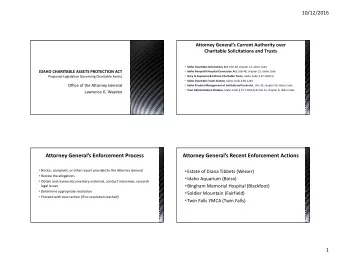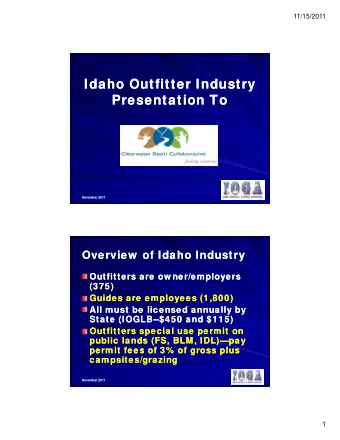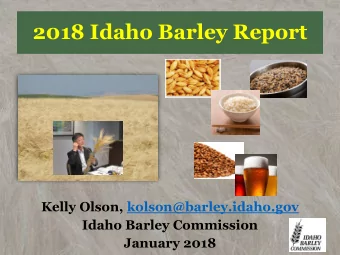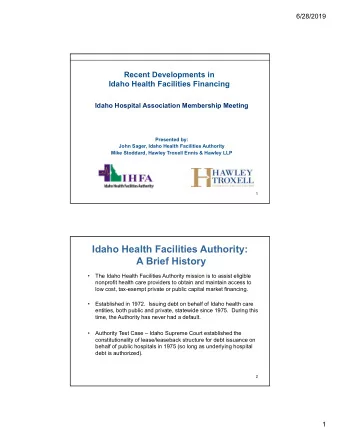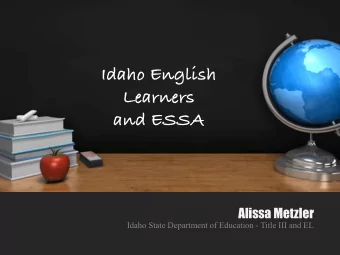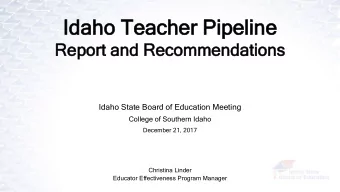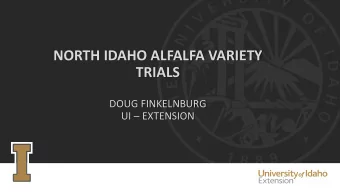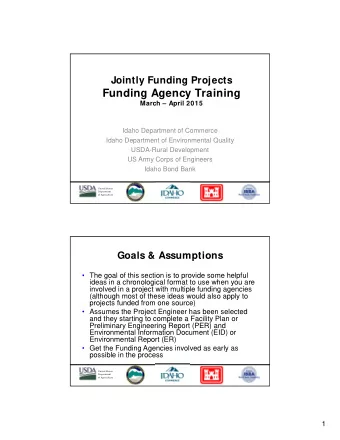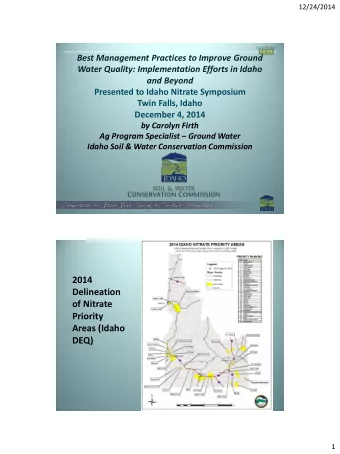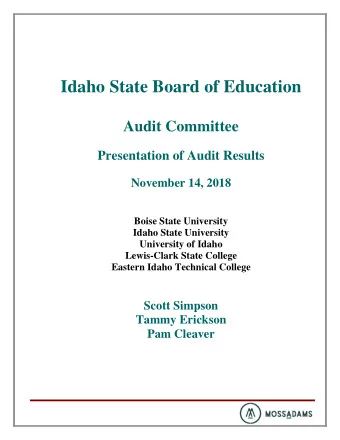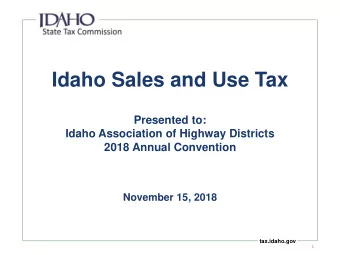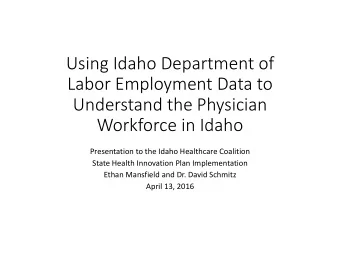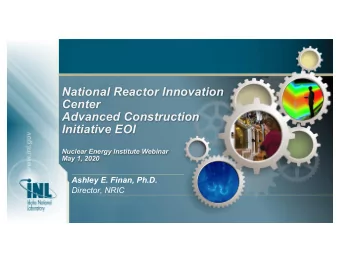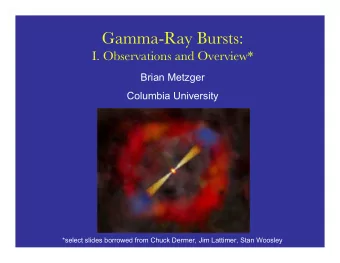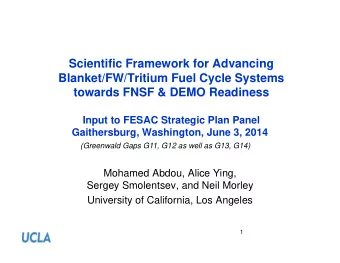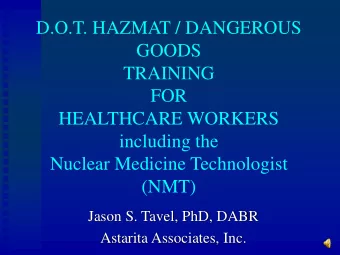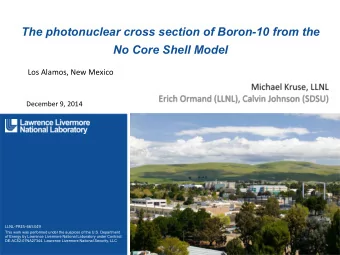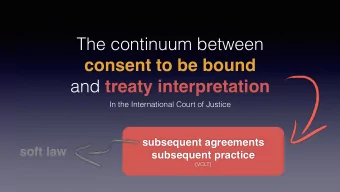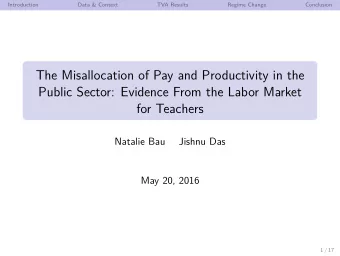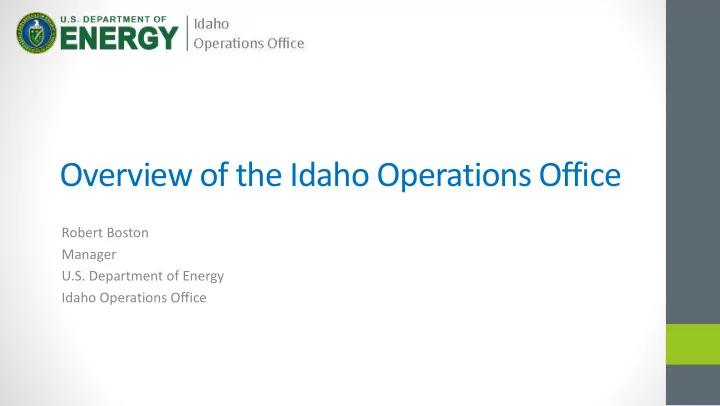
Overview of the Idaho Operations Office Robert Boston Manager U.S. - PowerPoint PPT Presentation
Overview of the Idaho Operations Office Robert Boston Manager U.S. Department of Energy Idaho Operations Office Idaho National Laboratory Infrastructure portfolio By the numbers 2 2 NE-ID Organization Chart Office of Nuclear Energy
Overview of the Idaho Operations Office Robert Boston Manager U.S. Department of Energy Idaho Operations Office
Idaho National Laboratory Infrastructure portfolio – By the numbers 2 2
NE-ID Organization Chart Office of Nuclear Energy Assistant Secretary for Nuclear Energy Vacant (NE-1) Principal Deputy Assistant Secretary Ed McGinnis (NE-2) Chief Operating Office Dennis Miotla Idaho Operations Office Manager Robert Boston Nuclear Energy Program Nuclear Energy Facilities, 3 Support & Execution Operations & National Security Deputy Manager Deputy Manager Amy Grose William Miller
Idaho Operations Office Organizational Responsibilities ➢ Procurement Management ➢ Operational Oversight / Contractor Assurance ➢ Headquarters Support ➢ Security of Nuclear Material and Information Security Systems ➢ Site Stewardship ➢ Project Management 4
M&O Contractor Performance ▪ DOE tailors its oversight based on the INL’s use of and results from internal systems and oversight (e.g. Contractor Assurance) ▪ DOE defines performance expectations annually in a Performance Evaluation and Measurement Plan • focused toward strategic objectives and • allows the contractor to determine the best way to achieve objectives ▪ DOE manages the Battelle Energy Alliance, LLC (BEA) contract, BEA runs the Lab 5
INL FY18 Economic Summary ▪ When combined with indirect and induced impacts, INL operations (BEA’s alone) add $2.06 billion to Idaho’s total output ▪ The total employment impact of INL operations accounts for 2.1% of Idaho’s employment ▪ INL brought money into Idaho and generated value-added output of more than $1.2 billion Total Economic Impact $2,058,545,000 ▪ INL accounted for more than 2.9% of statewide economic output INL Direct Spending $1,089,177,000 6
INL’s 70 year history of supporting nuclear power in the U.S. ▪ EBR 1 - 1951 ▪ SIW Submarine Thermal Reactor - 1953 ▪ Materials Test Reactor – 1953 ▪ Borax - 1954 ▪ Engineering Test Reactor – 1957 ▪ TREAT 1959 ▪ EBR II - 1964 ▪ Advanced Test Reactor – 1967 ▪ Loss of Fluid Test Facility - 1976 7
Nuclear Science User Facilities and Enabling Capabilities Hot Fuel Examination Facility Advanced Test Reactor Transient Reactor Test Facility Provides the research community a means to conduct cutting-edge nuclear energy R&D by providing access to unique irradiation and post-irradiation examination capabilities, located at Idaho National 8 Laboratory and various partner facilities.
Purpose of the Advanced Test Reactor ▪ What do we do? • We produce neutrons • Materials testing time machine • Medical isotope production ▪ For whom? • U. S. Navy • Universities • Nuclear industry worldwide • Medical applications ▪ Why? • U.S. Navy fleet sustainability • Advancement of nuclear energy technology 9 • Cancer treatment
Small Modular Reactors (SMR) ▪ INL supports safe characterization, RD&D, and regulatory support for the first SMR anywhere in the world ▪ DOE granted a site use permit to Utah Associated Municipal Power Systems (UAMPS) Carbon Free Power Project (CFPP) in February 2016 that enables UAMPS to locate a NuScale-designed SMR at the INL ▪ The Joint Use Module Plant (JUMP) concept is being developed to commercially demonstrate Hybrid Energy Systems (HES) and secure reliable microgrid applications ▪ Considerations for new INL electric power purchase agreement ▪ Other advanced reactor companies 3-D view of six NuScale modules interested in siting in Idaho 10
Enabling Microreactors and Small Modular Reactors EBR-II dome being kept for microreactor development and testing 11
Resumption of Transient Testing Program TREAT Transient Reactor Test Facility (TREAT) resumption of operations accomplished 12 months ahead of schedule and for nearly $20 million less than originally estimated TREAT Configuration & Unique Features Fuel Assembly Lift from Core Low Power Operations Resume at 12 TREAT Top of the Reactor November 14, 2017
Irradiated Materials Characterization Laboratory (IMCL) Advanced Post Irradiation Examination Capability utilizing state of art equipment 13
Recent Nuclear Energy R&D Legislation ▪ The 2018 Nuclear Energy Innovation and Modernization Act (NEIMA) directs the U.S. Nuclear Regulatory Commission (NRC) to develop a “technology - inclusive licensing framework” for use by advanced reactor designers by 2027. NEIMA also directs the NRC to develop a licensing process for advanced reactors within two years ▪ The 2018 Nuclear Energy Innovation Capabilities Act (NEICA) calls for construction of a fast neutron Versatile Test Reactor by 2026 . Currently, the world’s only fast neutron source reactor available to U.S. companies and capable of performing the needed tests is in Russia. ▪ NEICA also directs DOE to establish a National Reactor Innovation Center (NRIC) . The NRIC will be a place where private-sector companies can come and demonstrate advanced reactor concepts. ▪ Any commercial or DOE-operated reactors proposed for location at INL or anywhere else in the U.S. will be required under the 1970 National Environmental Policy Act (NEPA) to undergo extensive Environmental Impact 14 Statement studies, which will of course involve public scoping meetings and consideration of all reasonable alternatives.
Versatile Test Reactor 15
HALEU Interim and Long-term Stocks ▪ Interim – Downblending current and/or recovered HEU in the federal complex • Multiple physical forms (metallic, oxide, etc.) • An array of U-235 enrichments (10-19.75%) HALEU • Fast and thermal-spectrum reactor concepts • Limited stocks available today time ▪ Long-term - Enrichment • UF 6 HALEU • By 2021 demonstration quantities • Commercial domestic source of HALEU time 16 16
HALEU Interim and Long-term Stocks • The Nuclear Energy Institute’s 2018 survey of industry indicates need for ~600MT of HALEU by 2030 • HALEU provides more efficient fission (longer fuel life) in advanced reactors • Currently – refuel every 18 months • Advanced reactors – fuel lasts 10 to 17 years, followed by core replacement and core recycling • Three DOE initiatives to supply HALEU 1. EBR II Driver Fuel - Total of 10 MT HALEU at 1 MT/year (started) 2. ZIRCEX-Integrated Processes – 5 MT/year of HALEU by 2025 3. Centrus (Oak Ridge procurement) – commercial-scale production at Piketon, OH if large HALEU market is established All three of these initiatives will proceed in compliance with the National 17 Environmental Policy Act
National Security Programs Impactful, Relevant, Urgent ▪ Electric Grid Security & Resilience Sustaining This • Control systems cyber security Preventing This • Leading & integrating national effort • Strong utility & academic partnerships • Transforming the Nation’s resilience through awareness, capability development, equipping & exercising ▪ Nuclear Nonproliferation discovermagazine.com • Understanding the nuclear threat • Minimizing & eliminating the threat Armor • Responding to nuclear threats Production ▪ National Defense Range Testing & Training • Equipping our warfighters • Capabilities & technical solutions for national level needs 18
Cybercore Integration Center and Collaborative Computing Center Status Cybercore Collaborative Integration Center Computing Center 19
Summary NE and INL have important Missions that contribute to Energy Development and Security Improvement ▪ Advancing nuclear power as a resource capable of contributing to our Nation’s clean energy, environmental, and national security needs ▪ Addressing technical issues, costs, safety, proliferation resistance, and security barriers through research and development ▪ Sustaining the Current Fleet of Light Water Reactors ▪ Small Modular Reactor Research Support ▪ Researching Advanced Reactor Materials and Fuel Types ▪ Nuclear Science User Facilities and Enabling Capabilities ▪ Attract and grow new talent ▪ Support U.S. readiness and response to evolving threats to our people, our critical infrastructure, and 20 our installations
Recommend
More recommend
Explore More Topics
Stay informed with curated content and fresh updates.
